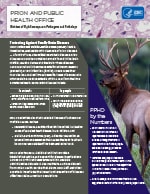Prion and Public Health Office
The Prion and Public Health Office within DHCPP fulfills CDC’s responsibilities as the lead agency for monitoring the occurrence of human prion diseases in the United States. The office coordinates CDC’s activities and programs related to prion diseases as well as to select neurological diseases and syndromes of unknown etiology.
Prion diseases, or transmissible spongiform encephalopathies (TSEs), are a family of rare progressive neurodegenerative disorders that affect both humans and animals. They are distinguished by long incubation periods, characteristic spongiform changes associated with neuronal loss, and a failure to induce inflammatory response.
The causative agent of TSEs is believed to be a prion. A prion is an abnormal, transmissible agent that is able to induce abnormal folding of normal cellular prion proteins in the brain, leading to brain damage and the characteristics signs and symptoms of the disease. Prion diseases are usually rapidly progressive and always fatal.
Prion Diseases include:
- CJD (Creutzfeldt-Jakob disease, classic)
- vCJD (variant Creutzfeldt-Jakob disease)
- BSE (bovine spongiform encephalopathy, or mad cow disease)
- CWD (chronic wasting disease)
Activities include:
- Monitoring and studying human prion diseases
- Consulting with clinicians, health departments, federal agencies, and other relevant organizations
- Providing support during epidemiological investigations
- Facilitating the study of brain autopsies for diagnosed and suspected cases of prion disease
